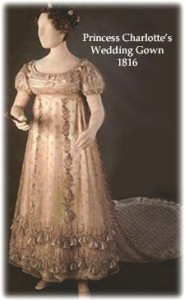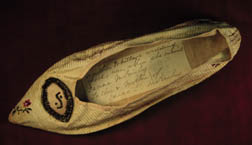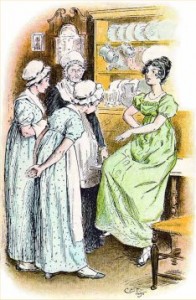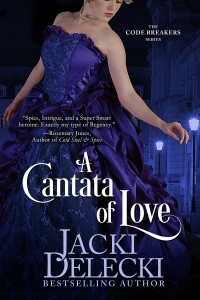Code Breakers Series
Category
Five Fascinating Facts about Regency-era Weddings
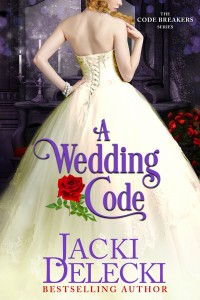 One of the reasons many readers enjoy historical fiction is that it provides a glimpse into the lives, relationships and traditions of different countries and eras. Weddings and marriage are, by far, one of the most fascinating topics to research.
One of the reasons many readers enjoy historical fiction is that it provides a glimpse into the lives, relationships and traditions of different countries and eras. Weddings and marriage are, by far, one of the most fascinating topics to research.
Here are five interesting facts I discovered about weddings and matrimony during the Regency era while writing my upcoming release, A Wedding Code (The Code Breakers series book 5, releasing April 25, 2017).
For many centuries, marriage was not based on love, but as a strategic alliance between families for monetary, social or political gain. Marriages were often arranged when the bride and groom were still children.
Although the popularity of love matches began gaining popularity in 18th and 19th century England, demonstrating passion for one’s spouse was considered déclassé.
Almack’s, a London social club, became one of the most prominent “marriage marts” of Regency England. Debutantes, who once sought to be presented at the King’s court, vied for vouchers from Almack’s patronesses so they could be presented there instead.
Regency brides did not commission gowns exclusively for their wedding. Most gowns were re-worn. Although any color or pattern was acceptable, blue, white, silver and light-colored hues were most popular. Instead, many brides cherished their wedding shoes as treasured keepsakes.
Brides were given a wedding ring during the wedding ceremony, but men did not wear wedding rings.
What is your favorite contemporary or Regency-era wedding tradition?
Excerpt: A Cantata of Love (Regency Romantic Suspense)
Research is one of the reasons I love writing Regency-era romantic suspense. Digging into history is fascinating and these factual events often inspire my plots. A Cantata of Love, book 4 in the Code Breakers series, features spies that use music to transmit secret messages. Here is an excerpt for you to enjoy.
Napoleonic France is no place for an Englishman, especially Michael Harcourt, the Earl of Kendal, who is on a clandestine assignment for the Crown. Already injured and facing imminent discovery by Napoleon and Fouche’s men, Michael finds his escape made even more perilous when he is charged with the safety of a young boy who must be spirited out of Paris.
Desperate to escape the terrible fate that awaits her if she remains in France, Lady Gabrielle De Valmont must disguise herself as a boy and rely on the cunning of a virtual stranger—an Englishman, no less—to smuggle her out of the country. When the Earl’s injury becomes severely infected, rendering him gravely ill, Gabrielle realizes it is now up to her to save them both.
Excerpt – Prologue & Chapter One
1803
In the seaside town of Berck, France
Gabrielle De Valmont brushed back Lord Kendal’s blond curls and applied the wet cloth to his burning brow. His long, golden waves and eyelashes accentuated his fiery red cheekbones. In their days of hard travel from Paris, the earl’s gunshot wound had festered into a nasty infection.
At this moment, he rested. For days, when the fever spiked, he thrashed about, calling out about sending a code book to a woman named Henrietta.
Desperate to soothe him, Gabrielle discovered that he would calm with the French songs of her childhood.
They couldn’t hide much longer without being discovered by Napoleon’s or Fouché’s henchmen. When the earl’s condition had worsened to the point where he could no longer travel, Gabrielle had brought them, under cover of darkness, to her former mémé’s tiny village of Berck, south of Calais.
For eight long days and nights, she had cared for the feverish earl. Their presence in the tiny town couldn’t be kept secret much longer. They must leave Berck, and France, soon. But how could they flee with the French soldiers on high alert, inspecting every boat crossing the English Channel?
Monsieur Denby, Lord Kendal’s valet, had assured her that he had a plan to divert their attention.
Exhausted and despondent, she beseeched the Blessed Virgin for their safe escape and the earl’s recovery.
She also prayed that the earl would forgive her and Mother Therese for their deception. She had to believe that Lord Kendal would never abandon her to her terrible fate.
***
Michael Harcourt, the Earl of Kendal, woke to a soft voice and the delectable smell of a woman. She smelled like wildflowers. And her voice was soothing and sweet. Last night must have been one hell of a night of dissipation since he remembered nothing. But he had dreamed of his French mother crooning to him.
What was wrong with him? He had been in bed with a French woman, and he’d thought of his mother. His head ached as if horses had trampled over him. He tried to remember her name—Yvette? Or was it Mimi? He cracked open one lid. Big blue eyes the color of cornflowers stared down at him, and a lush, pink lower lip pouted. How could he have forgotten this angel’s name? Yvette. Definitely Yvette. “Yvette? Or maybe Mimi?”
He needed her again to refresh his memory. He raised his arms to pull her against him. He grabbed for her, but his arms felt weak. Thank God the rest of his body wasn’t that tired. She yelped when he wrapped his arms around her and pulled her on top of him. “Yvette, darling. Don’t fight me. I need you.”
Yvette gasped and tightened against him. He rubbed himself against her slender body. Not his usual type, he noted. Clearly not an opera dancer by the slender frame. What had he drunk last night that he couldn’t remember this delectable handful?
“Let go of me,” she hissed.
He whispered against her soft, tender neck, kissing her ear. “Were you this feisty last night?”
“Let me go, you brute.” She shouted in his ear, causing his head to feel as if it were cracking wide open. She jumped back, tripping on the bedclothes and knocking the water canister from the side table. The loud crash reverberated in his head.
Women didn’t fight him. He was a generous lover. Was he overlooking something from last night?
Michael looked at the disheveled, bewitching woman glaring at him. Hair the color of honey sparkled in the morning sunlight, but her bright eyes were now dark and stormy.
Damn, damn. She looked far too innocent and way too marriageable. What had he gotten himself into?
He rearranged the bedding to hide the obvious, then lifted himself to the head of the bed.
The mademoiselle didn’t look so much offended as just plain pissing mad. Her eyes had narrowed, and she glowered at him—the look of a woman who might impale him with the fireplace poker. He had gotten into a lot of scrapes, but this wasn’t how he imagined finding a wife.
The door to his bedroom swung open, knocking against the wall. The pain behind his eyes pounding like a son of a…
Denby, his valet, stormed into the room, swearing under his breath. “What the hell? Are you alright, Mademoiselle Gabrielle?”
She gestured with her hands and spoke in rapid French to Denby. Had she just called him, the Earl of Kendal, a “stupid horse’s ass”?
Denby took the irate woman’s arm. “I’ll clean up the mess. Now that he’s awake, you should prepare yourself to leave. We’ve a long journey ahead of us.”
With no word of farewell, the Mademoiselle Gabrielle huffed and left the room.
Denby chuckled. “Barely awake and already causing problems.” He bent to pick up the water container. “It is good to see you back, my lord. You scared the hell out of me. If it weren’t for Mademoiselle Gabby’s nursing, I’m not sure…”
“I’ve been sick?” He did feel a bit weak after his tussle with the delectable young woman.
“You developed a fever right after we escaped from Paris.”
The memory of fleeing Paris and Fouché’s men brought him totally awake. “My last memory is leaving Paris dressed as a nun.”
Denby handed him a glass that had survived the mademoiselle’s spirited response. “You developed a fever from your gunshot wound, and we had to hide out here. This is where Mademoiselle Gabby’s nanny is from and the people helped us.”
Gabby. He didn’t have any recollection of Gabby when they left Paris. “How long have I been out? And who is Gabby?”
“I’m glad you’re ready to travel. I’ve got a bad feeling if we don’t get out of here soon, all of Fouché’s and Napoleon’s men are going to descend.”
He only remembered Denby, and the boy, Pierre, fleeing for their lives dressed as nuns. He had stolen the code book from Le Chiffre, and everyone in Paris seemed to be after him. He wondered if Henrietta had received the book.
“Any news from England? Do we know if Henrietta received the package?”
“I haven’t been able to make any contact. We’ve been in hiding. I’ve arranged for a boat from Calais. They’ve been waiting for a signal that you’re able to travel. We go tonight with the tide. I want to get us out of France. I can’t breathe here.”
“Did you shake the villain who was posted at my house in Paris too?”
“Yes, but we can’t stay here any longer. I’ll change the bandages and get you some breakfast. You’ll rest up before we make the trip. We have to go by horseback, and I hope it won’t open your wound.”
He suddenly was assailed with the ignominy of the location of his wound. He had been shot in the arse by an unknown assailant while fleeing after he had stolen the code book. The code book, literally, was a pain in his arse.
He sure hoped to hell it gave England a tactical advantage against the power-hungry Napoleon.
For more information or to keep reading, click HERE.
A Cantata of Love now available on audio, as well as print and ebook
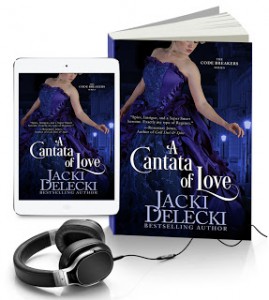 A Cantata of Love is now available on audio. Enjoy Chapter One, narrated by Pearl Hewitt, the talented voice actor who narrated the other three titles in the series. Click HERE to listen now.
A Cantata of Love is now available on audio. Enjoy Chapter One, narrated by Pearl Hewitt, the talented voice actor who narrated the other three titles in the series. Click HERE to listen now.
Not an audiobook fan? Do you prefer print books while everyone else seems to have made the jump to ereaders? Have you ever wondered why you prefer one book format over another? Believe it or not, your format preference is motivated by a number of interesting factors. Here’s what research and scientific theory have to say about why readers prefer different book formats.
A 2011 survey revealed different buy vs. borrow rates for book formats. Between 54% and 61% of print and ebook readers preferred to own copies of books, compared to just a third of audiobook listeners. Of the 61 percent of audiobook borrowers, those with library cards were more likely to borrow instead of buy copies.
Many people assume that young readers prefer ebooks, which can be accessed on digital devices, but research contradicts this assumption. A survey of 16-24-year-old readers indicated more than 60% preferred print books, most who said they liked holding a book in their hands.
Ebooks don’t offer a sensory reading experience, but they deliver a wealth of practical advantages that appeal to readers:
- Cheaper than print books
- Instant access/immediate gratification
- Convenience
- Storage space is not an issue
- Less conspicuous
- Portability
People process information differently Educators recognize seven learning styles. A person’s (combined) learning style can influence which book format they prefer.
- Visual (spatial): Preference for pictures, images, and spatial understanding.
- Aural (auditory-musical): Preference for sound and music.
- Verbal (linguistic): Preference for words, both in speech and writing.
- Physical (kinesthetic): Preference for body, hands and sense of touch.
- Logical (mathematical): Preference for logic, reasoning and systems.
- Social (interpersonal): Preference for groups or with other people.
- Solitary (intrapersonal): Preference for being alone and self-study.
Some research has been conducted on how personality traits impact entertainment preferences. The theory is that different types of content fulfill different psychological needs, such as mood, attitude and disposition.
Lifestyle undoubtedly influences what format readers prefer. One Reddit discussion thread demonstrates this in an example provided by WoodensBeard who wrote about having time in his late teens to “read books ad nauseum,” but later in life did not have space for storing books nor time to read them so he’d turned to audiobooks, listening while cooking, cleaning, traveling and using his computer.
So why do different people prefer different formats? Here are my unscientific, unproven theories:
People who prefer print books like the tactile sensation of reading, such as the weight of the book, the sound and sensation of flipping pages and the scent of books. They also enjoy the visual component of full bookshelves, catching sight of favorite titles/authors and the imagery of covers.
People who prefer ebooks are motivated by practical concerns such as cost and convenience.
People who prefer audiobooks like the convenience and accessibility, as well as the auditory “storytelling” component.
Authors know readers have difference preferences, which is why so many deliver their books in all three formats. When one of our primary goals is to connect with new readers, offering print, ebook and audiobooks amplifies our opportunities to do so.
If you would like to receive the audio version of A Cantata of Love in exchange for an honest review on Audible, please email me at Jacki@JackiDelecki.com.
New Release Giveaway
It’s release day for A Cantata of Love, book 4 in The Code Breakers series. I’m celebrating with a fun giveaway. There are lots of ways to enter. One lucky winner will receive an e-gift card from Gyft.com, where you can shop from more than 200 retailers.
Add heart-pounding adventure, international intrigue, and sizzling romance to your summer reading list with A Cantata of Love.
Napoleonic France is no place for an Englishman, especially Michael Harcourt, the Earl of Kendal, who is on a clandestine assignment for the Crown. Already injured and facing imminent discovery by Napoleon and Fouche’s men, Michael finds his escape made even more perilous when he is charged with the safety of a young boy who must be spirited out of Paris.
Desperate to escape the terrible fate that awaits her if she remains in France, Lady Gabrielle De Valmont must disguise herself as a boy and rely on the cunning of a virtual stranger—an Englishman, no less—to smuggle her out of the country. When the Earl’s injury becomes severely infected, rendering him gravely ill, Gabrielle realizes it is now up to her to save them both.
Amazon | BN | iBooks | Kobo | Google
Hiding secret messages in music
Do you know how to read music? If so, take a look at this and tell me if you notice anything unusual about it.
 This is known as the BACH motif, which is an example of musical cryptography, a coded system used to create musical note sequences for names or other messages in musical compositions.
This is known as the BACH motif, which is an example of musical cryptography, a coded system used to create musical note sequences for names or other messages in musical compositions.
I have been intrigued by the idea of using musical scores and passages to encrypt messages for some time and thought it was a great concept for my Code Breakers Regency romantic suspense series. It provided inspiration for my current project, book 4 in the Code Breakers series, CANTATA OF LOVE.
Part of my fascination with this method of ciphering stems from my love of music. I’ve studied both voice and piano–mainly jazz– and I appreciate the mathematical complexity of music. Coding a message into a song’s musical score or the song lyrics requires a great deal of creativity and presented a tremendous challenge as I plotted the story. While researching period opera singers, such as Mrs. Elizabeth Billington, I discovered that operas were written for singers to show off their voices and allowed for improvisation. That would certainly have made it easy for musicians and performers to send coded messages to specific individuals!
Early examples of musical cryptography include Baroque composers who wove their names or the names of significant individuals into musical selections. The application found popularity with those engaging in espionage, due to the difficulty in breaking musical codes. Other examples of musical coding can be found in the songs of American slaves. Negro spirituals provided a means of communication for those who wanted to escape slavery; references to “going home” or “bound for Canaan” didn’t signify death and heaven but heading north to Canada and freedom.
In 2013, International Science Times featured a story that suggested a musical score written by composer Gottfried Federlein contained annotations that secretly documented the location of buried Nazi treasure.
One online website reports a number of “creepy spy radio transmissions” that feature suspected musical clues and/or codes broadcast over shortwave radios. This practice began around the time of WWI and continues today.
A special thank you to my friend and music composer Greg Bartholomew, who shared his expertise with me on this topic. Here is one of his compositions, Baby Blue Roses. When Daisies Pied is an example of a piece of music ladies would have sung during the Regency period.
Are there any songs you believe contain a hidden message?
![JackiDelecki_ACantataofLove_HR[1]](http://jackidelecki.com/wp-content/uploads/2015/10/JackiDelecki_ACantataofLove_HR1-200x300.jpg) A Cantata of Love, Book 4 in The Code Breakers Regency Romantic Suspense series, releases June 28th. You can pre-order on iBooks.
A Cantata of Love, Book 4 in The Code Breakers Regency Romantic Suspense series, releases June 28th. You can pre-order on iBooks.
Napoleonic France is no place for an Englishman, especially Michael Harcourt, the Earl of Kendal, who is on a clandestine assignment for the Crown. Already injured and facing imminent discovery by Napoleon and Fouche’s men, Michael finds his escape made even more perilous when he is charged with the safety of a young boy who must be spirited out of Paris.
Desperate to escape the terrible fate that awaits her if she remains in France, Lady Gabrielle De Valmont must disguise herself as a boy and rely on the cunning of a virtual stranger—an Englishman, no less—to smuggle her out of the country. When the Earl’s injury becomes severely infected, rendering him gravely ill, Gabrielle realizes it is now up to her to save them both.




